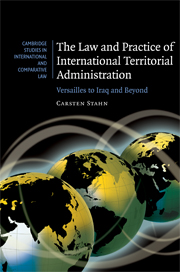Book contents
- Frontmatter
- Contents
- Foreword
- Preface
- Selected table of cases
- List of abbreviations
- Table of engagements
- Introduction
- Part I The historical and social context of international territorial administration
- Part II The practice of international territorial administration: a retrospective
- Part III The foundations of international territorial administration
- Part IV A typology of legal problems arising within the context of international territorial administration
- Part V International territorial administration at the verge of the twenty-first century: achievements, challenges and lessons learned
- Bibliography
- Index
- CAMBRIDGE STUDIES IN INTERNATIONAL AND COMPARATIVE LAW
Introduction
Published online by Cambridge University Press: 19 January 2010
- Frontmatter
- Contents
- Foreword
- Preface
- Selected table of cases
- List of abbreviations
- Table of engagements
- Introduction
- Part I The historical and social context of international territorial administration
- Part II The practice of international territorial administration: a retrospective
- Part III The foundations of international territorial administration
- Part IV A typology of legal problems arising within the context of international territorial administration
- Part V International territorial administration at the verge of the twenty-first century: achievements, challenges and lessons learned
- Bibliography
- Index
- CAMBRIDGE STUDIES IN INTERNATIONAL AND COMPARATIVE LAW
Summary
Die Pfosten sind, die Bretter aufgeschlagen,
Und Jedermann erwartet sich ein Fest.
Sie sitzen schon mit hohen Augenbrauen
Gelassen da und möchten gern erstaunen.
Allein sie haben schrecklich viel gelesen.
Wie machen wir's, dass alles frisch und neu
Und mit Bedeutung auch gefällig sei?
Johann Wolfgang von Goethe, Faust, Vorspiel auf dem TheaterThe twentieth century has witnessed a proliferation of forms of international engagement in areas that were typically governed by states. The involvement of international actors in the administration of territory is one of them. The League of Nations assumed a significant role in territorial administration in the 1920s when undertaking functions of guarantee and administration under the Treaty of Versailles. This type of engagement gained new attention in the era of the United Nations (UN). Both the emergence of peacekeeping and the revitalisation of the collective security system after the end of the Cold War sparked a revival of experiments in international administration. Today, there is growing confidence that the UN can perform tasks of governance in post-conflict situations. The Handbook on United Nations Multidimensional Peacekeeping Operations includes international administration of territory as one of the functions of multidimensional peacekeeping. However, the format and practice of these engagements is still subject to considerable debate. The enthusiasm about robust UN governance missions that prevailed at the time of the establishment of UN Interim Administration in Kosovo (UNMIK) and the UN Transitional Administration in East Timor (UNTAET) at the end of the 1990s has been tempered by criticism of the UN's style of governance and calls for a move to “a light footprint” agenda, limiting the role of the UN to the provision of assistance to existing governing authorities and local actors.
- Type
- Chapter
- Information
- The Law and Practice of International Territorial AdministrationVersailles to Iraq and Beyond, pp. 1 - 42Publisher: Cambridge University PressPrint publication year: 2008



